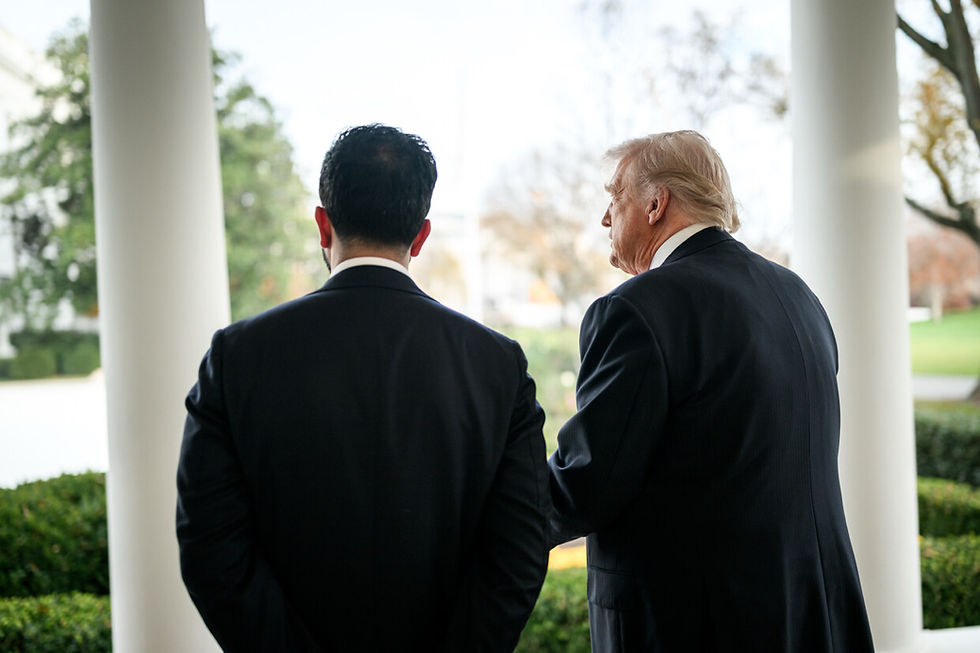Amorphous Centrism
- Tom Watkins

- Nov 17, 2025
- 4 min read

Occasionally, you stumble across something that perfectly articulates the current zeitgeist. Recently, Tim Stanley on the Daily T podcast explained that Farage and Reform are neither a right-wing nor left-wing party; they are a nationalist outfit. Essentially meaning that on some issues the party tacks left, on others they sway right. Fundamentally opportunist, everything is underpinned by the idea and sense, whether factual or not, that decisions are made for your, the British people’s, benefit.
Since the party has started to frequently poll as close to or above the hallowed 30% mark, the need to categorise what they represent has become ever more present. The frequent castigations that a Reform government would be a reincarnation of Nazism or leave the door ajar for fascism are misinformed. These comments are influenced by their loathing for Farage and his politics but miss the broader journey that the Reform leader is trying to take the party on.
Ex Reform/UKIP spinner Gawain Towler recently outlined that the current battle engulfing the right is between ‘Conservative authoritarianism’ and ‘Whiggish Libertarianism'. It is far simpler; figures on the right must choose to go down the path of a repackaged neoliberalism or drift further afield and become a more authoritarian outlet. In other words, do you want to be a Meloni or an Orban?
Farage is currently battling this dilemma. Attempting to de-cleanse and mainstream a movement that 47% of people think is racist, whilst not ostracising key, far-right actors that have done significant work to shift the Overton window in their favour. It is a hard balancing act. His recent elucidations on economics demonstrate a significant departure from his previous radical promises, as he attempts to deflect criticism of his sporadic policy approach. While the credence he now gives the idea of mass deportations – an idea previously firmly rejected – is significant and would’ve been unachievable without right-wing actors moving the dial.
He is trying to grow the breadth of his voter base. Deploying a multi-pronged approach that attracts the interest of different voter factions. As the Guardian wrote: “Each (Reform supporter) is motivated by a distrust of mainstream politics, but they have little else in common.” In this sense, Farage is moving to the centre, acting as an amorphous centrist. Someone defined as not being rigidly bound by the centre’s intellectual ruminations but having the ability to broaden out and take inspiration further afield on both the left and the right. The idea that issues are being addressed for voters of all income and status gives you more leeway and thus greater flexibility in your approach.
The Reform leader has demonstrated this acutely over the past 12 months. He has given thought to removing the two-child benefit cap, a Labour MP’s dream, recognising the vice it keeps financially stricken families in. Meanwhile, the protestations about a potential Reform cabinet being made up of business professionals, not MPs, are alluring to the private sector. Many of whom wish to have a role in the public realm, to bolster their status and personal influence.
The Italian leader, Giorgia Meloni, has taken a similar approach in attempting to woo both sides. Now the head of the third longest government in Italian history, she, like Farage, used to operate on the fringes of politics but has slowly gravitated towards the middle. This political journey she has been on allows her to wear various masks. At times, she whips up her traditional, right-wing base through bombastic rhetoric and crackdowns on migration, while at others she demonstrates an interventionist streak, slapping a windfall tax on bank profits and attempting to diminish the influence of the FDI. She is protectionist, corporatist, statist, critical of free markets and profoundly patriotic, the prototype amorphous centrist.
On paper, this feels like a quixotic mix, yet she is popular at home and on the global stage. The unequivocal support of Ukraine and NATO that Meloni espouses is a good inspiration for Farage. Trying to change, relitigate or tear down these and adjacent institutions or pacts would be an impossible thing for Farage to reason with the British public, no matter how much he is inspired by MAGA isolationism.
Such a scattergun approach can be survived in the US because of its hegemony and financial heft. The UK certainly isn’t blessed with such influence. The country’s economic malaise is endemic. Despite this, the current government have been credited for their cool hand approach by both markets and foreign investors. The IMF admired Chancellor Rachel Reeves, the balance between ‘macroeconomic stability, growth prospects and fiscal sustainability’ at their recent conference.
Fighting political battles in these waters is uncharted territory for Farage. The constant shrill of migration being the primary voter concern is a distraction; it will always fall to the wayside in favour of personal, economic security. Therefore, scrapping his £50bn plus tax cuts was a necessary move. Externally, it demonstrates prudence and reasonability to markets; internally, it shows to voters a party that wants to tackle problems with actionable solutions and not fanciful promises.
The overt political shift that Farage is undertaking demonstrates a seriousness about governance. Aping the political dexterity of Meloni will allow for greater manoeuvrability when in government and negates the permanent reliance on your base to constantly prop you up. How this will be received by the British public come election time is a tougher thing to predict. Frasor Nelson recently wrote, “Farage has run off to buy new political clothes.” There is only so much shapeshifting one figure can do. Charlatans are brushed off when it comes from a place of joviality, less so when they proclaim seriousness. Without oligarchical structure, media control or mass deference, right-wing politicians often drift back to the centre when in government. Even rhetorically rejecting rarely prevents its basic logic from being upheld. In the end, outcome and workability are what voters want; having the broadest coalition allows for the greatest range, and in turn, more solutions.
Image: Flickr/Gage Skidmore
No image changes made.
.png)



Comments